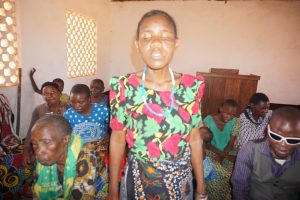Project Summary
The translation project for Kirimi Bible started in January 1999 and was expected to end in December; 2018.The completion date has been revised to 2020 due to reasons beyond our control including inadequate funding. The New Testament was completed, Published and officially launched in November 2010; and the translation of the Old Testament is still in progress, with some of the books translated and checked by our Translation Consultant.
This is the first Bible translation for Kirimi speakers. In 2019 we plan to continue with translation, harmonization, review, Computer Assisted Publisher (CAP) checks and Translation Consultant’s (TC’s) checks.
It is desired that in 2019 the following activities will be carried out:-
- Continue translating the books of Ezekiel.
- Harmonization of the books of Jeremiah,Lamentation and Ezekiel.
- Reviewing the translated books of Jeremiah,Lamentation and Ezekiel
- CAP checks of the books of Jeremiah,Lamentation and Ezekiel.
- Translation Consultant checks all remaining books
- Publishing and printing the book of Ecclesiastes as a Portion
- Para-text training for translators
- CAP follow up and monitoring
Traditionally the Kirimi community is marred by evil practices such as cattle rustling, witchcraft, alcoholism, polygamy and idolatry. Kirimi people have longed to have the Bible in their mother tongue for many years. This continuing translation is a blessing to this community. It is expected that, availability of the Bible in Kirimi language will have a positive effect on church growth and deepening of personal faith that will lead to changed behavior in the community-minimizing the bad practices. . Having the Bible in their language will not only enable them to understand the Bible better, but it will also help preserve their language and cultural heritage.
It is targeted that a total of 250,000 people will benefit from this project.
Our partners in this project are Lutheran, Anglican, and Pentecostal churches in the project area. The Bible Society has learnt that, Church involvement in the Bible cause brings great success to Bible translation work.
This project in line with Philadelphia promise and the Bible Society of Tanzania Strategic Plan (2018 – 2022)
Project Goal
To have the entire Bible published in Kirimi language,making it available for mission work.
Project goal’s relationship to overall bible society strategy
-To strengthen the church by providing it with evangelizing tools
-To give non Swahili speakers within Kirimi community access to the word of God.
Strategic Fit
Connecting your project to your Bible Society’s overall mission strategy
How does your project relate to the Philadelphia Promise?
The project relate to Philadelphia Promise affirmation that the mission of making available the Word of God to all through translation, publishing, printing, distribution, bible engagement, and advocacy.
About the beneficiaries
How did you arrive at your beneficiary impact number?
Through research and statistics
Beneficiary focus
The Bible will give access of the word of God to people of all ages, all Christian denominations, as well as people of other faiths. A large percentage of the Kirimi tribe is Christian. Some few are Muslim and others still cling to traditional faith.
How have the needs and perspective of the beneficiaries helped shape the design of the project?
It is the first Bible in Kirimi language. The New Testament was published and printed in 2010 and that publication created a lot of anxiety for the full Bible in Kirimi language.
Kirimi is spoken near Singida, The Kirimi people have long been ready for a translation of the Bible in their mother tongue. The project aims at translating the entire Bible into this language. Having the Scriptures in their language will not only enable them to understand the Bible better, but it will also serve to preserve their language and their cultural heritage.
National Context
Kirimi (Kinyaturu) is spoken near Singida, by around 250,000 people. The Kirimi people have long been ready for a translation of the Bible in their mother tongue. The project aims at translating the entire Bible into this language. Having the Scriptures in their language will not only enable them to understand the Bible better, but it will also serve to preserve their language and their cultural heritage.
Need
-Team work spirit was a vital element in the success of the project.
The Bible Society learnt that, church involvement in the Bible cause brings great success.
Unfortunately the project was not consecutively funded in the last 4 years. Lack of funding has slowed down the progress of the translation. The undesignated fund from the Bible Society was not be available to due to budget constraint.
The completion of the translation of the Bible can be improved or expedited if more funding was made to hire the translators on full time basis. Currently the translators are also given assignments by their Diocese. They must be attached to the church because what they are paid by the project is too little to sustain their living. With the current pace of translation the work may not be completed according to schedule.
How this project will help the beneficiaries
A complete Bible available in Kirimi language will have a very positive effect on church growth and deepening of personal faith, and lead to changed behavior in the society; spiritually, morally and socially in comparison with their past life experiences.



 Elisha Letema
Elisha Letema Judith Pembamoto
Judith Pembamoto

